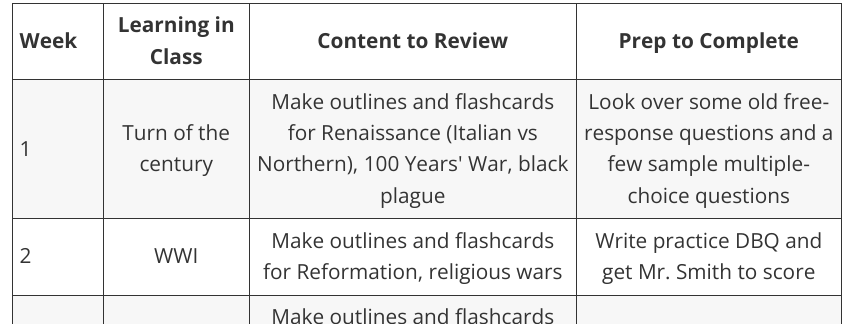It’s officially May, and your AP exams are weeks (or even days) away. Whether you’ve already been preparing for months, have just begun studying, or are praying for a zombie invasion, we have you covered (for the exams, not an impending apocalypse). Read on to discover tips for creating your individualized plan, optimizing your time, and, most importantly, maintaining your sanity as you prep for multiple exams.

Courtesy of Unsplash
Study phase I: know thy enemy.
Start with your class syllabus, old tests and quizzes, and the AP Course and Exam Description. The latter can be accessed on the College Board site, laying out everything you need to know for the exam.
Next, compare your syllabus with the Exam Description and look for any gaps or overlaps in content. Was there anything your class skimmed over? That’s your cue to dive deep into your review. And don’t forget those quizzes—they’re ideal for highlighting your weak spots.
AP study goals:
- Brush up on all major content areas.
- Prioritize areas where your knowledge is tenuous based on your quiz and test scores.
- Pay special attention to topics glossed over in class.
- Master all question types featured on the AP exam.
- Practice tackling everything from free-response math to essays.
Study phase II: the schedule
Alright, you’ve checked out what needs reviewing—now it’s time to map out your study schedule. A rough outline will usually do the trick, but feel free to get hyper-specific if that’s your thing. The key is having a game plan for what you’ll tackle each week.
Once again, your trusty class syllabus will be your guiding light. Use it to plot your attack. Subdivide the material based on the syllabus and how you plan to review it. Here’s a snippet of a 12-week study AP Euro plan:

Courtesy of Prep Scholar
When you kick off your prep, initially focus more on reviewing course content. As the big date approaches, shift gears toward honing those exam skills. (Visit our other post for more helpful information about active learning and best practices for studying different subjects.)
Eek! What if I don’t have twelve weeks to study for exams?
A three-week study plan will look very different from a nine-week one. (Unfortunately, we can’t create your plan for you without knowing your unique circumstances—we wish we could!)
If time is not on your side, consider targeting specific areas or concepts that comprise more significant portions of the exam or focusing mainly on areas of interest. (Remember, you don’t need to know everything to achieve a passing grade.)
Planning for multiple AP exams
Many students juggle more than one AP course, extracurriculars, and other obligations, so crafting a realistic schedule is critical.

Create a weekly study schedule for multiple exams where you can rotate your subjects. For example, you might schedule AP Lang prep on Mondays and Thursdays, AP Bio on Tuesdays and Thursdays, and AP Spanish on Fridays. (Like in the AP Euro example, break each subject down using the syllabus and your specific study goals.)
Rotating your prep not only enhances your ability to retain the material but also helps to prevent burnout. Avoid the temptation to overload yourself and schedule plenty of restorative time.
Phase III: how to study
If you haven’t already, consider investing in some AP study books. You can also find ample resources online if you prefer that route. Dive into supplemental resources like podcasts, YouTube videos, and Khan Academy, and if possible, create your own study materials through sites like Quizlet or Kahoot. Creating your own summaries, charts, graphs, or problem packets encourages you to make meaningful connections between concepts.
Try the Pomodoro Method.
This method is excellent for breaking study sessions into manageable chunks of time and helps to minimize distractions.
Take loads of practice tests!
You can find practice assessments almost anywhere—on the College Board, in AP prep books, or by general Googling. Try taking at least one full practice test (ideally, more than one) before exam day. Track your progress and use the results to tweak your study plan.
Major takeaways?
With the proper tools and prep, your AP studying will hopefully be more productive (and less painful). We recommend creating a targeted plan of attack that includes shorter, regular sessions across the week and balancing content review with practice exams.
As trite as it sounds, consistency is key.
However, we’re always here to help if you’re still feeling overwhelmed! We offer expert support across AP subjects and can assist at any point during the prep process. Feel free to contact us or check out our resources page for more information.


